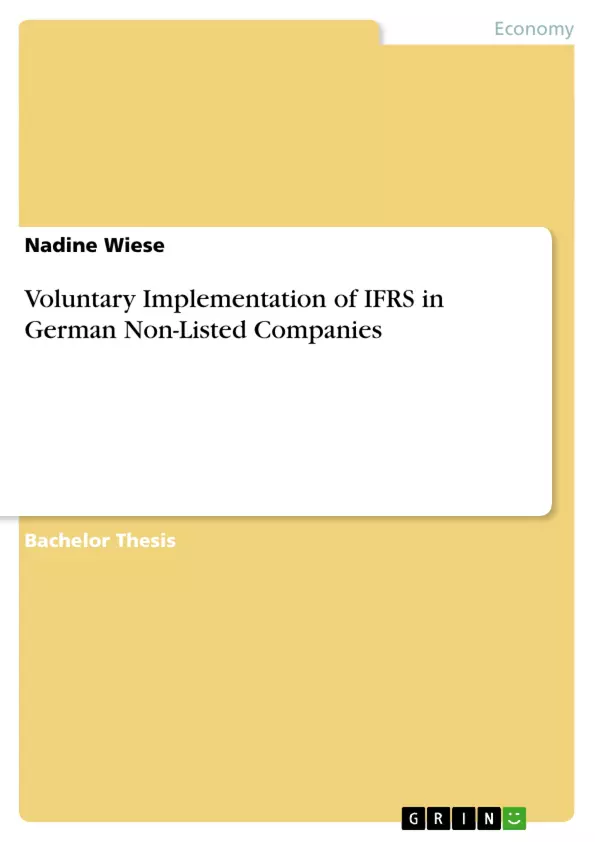This report addresses the question whether unlisted German companies should voluntarily adopt IFRS. Benefits for internal as well as external users are discovered including facilitated international comparability and higher quality of financial reports. Furthermore, a comparison reveals that equity figures and volatility are higher under IFRS than under German GAAP. It is discovered that national economic and political circumstances significantly influence reporting practices and thus quality and comparability. Combined with fair value accounting which is of lower reliability as there are no active markets from which values can be derived, IFRS not necessarily seems to be a better alternative compared to German GAAP. Moreover, because IFRS is primarily intended for listed companies and investors’ needs, IFRS only appears to be an alternative for non-listed companies that plan a listing. In general, the complex and costly implementation process must be outweighed thoroughly. If costs prevail other possibilities represent IFRS for SMEs or the continuation of German GAAP.
Inhaltsverzeichnis (Table of Contents)
- Scenario
- Executive Summary
- Introduction
- Expected benefits from the IFRS adoption
- Differences between German GAAP and IFRS (1140)
- Property, Plant and Equipment
- Intangible Assets
- Investment Property
- Impairment
- Provisions
- Discussion on alleged consequences of the IFRS implementation
- Critical review of information sources
- Conclusion
- References
- Appendix
- Procedure of the first-time adoption under IFRS 1
Zielsetzung und Themenschwerpunkte (Objectives and Key Themes)
This report explores the potential benefits and consequences of unlisted German companies voluntarily adopting International Financial Reporting Standards (IFRS). The main objective is to determine whether IFRS presents a viable alternative to German GAAP for non-listed companies. Key themes include: * **Benefits of IFRS Adoption:** The report investigates the potential benefits of IFRS for both internal and external users, including improved international comparability and higher quality financial reporting. * **Differences between German GAAP and IFRS:** The report examines the specific differences between German GAAP and IFRS, focusing on areas such as property, plant and equipment, intangible assets, investment property, impairment, and provisions. * **Consequences of IFRS Implementation:** The report analyzes the potential consequences of adopting IFRS, including the impact on financial statement quality and decision-usefulness. * **Fair Value Accounting and Reliability:** The report addresses the reliability of fair value accounting, particularly for non-listed companies where active markets may not exist. * **Cost-Benefit Analysis:** The report considers the potential costs and benefits of implementing IFRS, weighing the complexities and costs of the implementation process against the potential advantages.Zusammenfassung der Kapitel (Chapter Summaries)
- **Scenario:** The report begins with a scenario describing a research assistant in a German non-listed company tasked with investigating the voluntary adoption of IFRS. The finance director is considering the potential benefits of IFRS and seeks information on the potential impact on the company and its stakeholders.
- **Executive Summary:** The executive summary summarizes the key findings of the report. It highlights the potential benefits of IFRS for internal and external users, such as improved international comparability. However, the summary also raises concerns about the reliability of fair value accounting and the potential costs of implementing IFRS.
- **Introduction:** The introduction provides background information on the adoption of IFRS by listed German companies and the potential for voluntary adoption by non-listed companies. The introduction discusses the potential advantages of IFRS, such as increased comparability and reduced compliance costs. It also highlights the need to assess whether IFRS is beneficial for non-listed companies.
- **Expected benefits from the IFRS adoption:** This chapter examines the potential benefits of IFRS for both internal and external users. It discusses how IFRS can improve the transparency and comparability of financial reporting, potentially leading to increased investor confidence and access to capital markets.
- **Differences between German GAAP and IFRS (1140):** This chapter explores the differences between German GAAP and IFRS, focusing on specific areas such as property, plant and equipment, intangible assets, investment property, impairment, and provisions. The chapter provides detailed explanations of the accounting standards under each framework, highlighting the key discrepancies and their potential impact.
Schlüsselwörter (Keywords)
This report focuses on key concepts such as IFRS, German GAAP, voluntary adoption, international comparability, financial reporting quality, fair value accounting, cost-benefit analysis, and non-listed companies. The report explores the potential benefits and consequences of adopting IFRS for unlisted German companies, examining factors such as the reliability of fair value accounting and the complex implementation process.Frequently Asked Questions
Why would a non-listed German company adopt IFRS voluntarily?
Companies may adopt IFRS to improve international comparability, increase financial reporting quality, and better prepare for a potential future capital market listing.
What are the main differences between German GAAP and IFRS?
Key differences lie in the valuation of intangible assets, property, plant and equipment, the treatment of provisions, and the frequent use of fair value accounting under IFRS.
Is IFRS always better than German GAAP for SMEs?
Not necessarily. IFRS is complex and costly to implement. For many non-listed companies, the benefits may not outweigh the high administrative costs and the volatility introduced by fair value accounting.
What is the problem with „fair value“ for non-listed companies?
Fair value is less reliable when there are no active markets to derive values from, which is often the case for assets held by private, non-listed companies.
What are the alternatives to full IFRS?
Alternatives include „IFRS for SMEs“, which is a simplified version of the standards, or continuing to use the established German GAAP (HGB).
How does IFRS affect equity and volatility?
Generally, equity figures tend to be higher under IFRS, but the reporting also shows higher volatility due to the frequent revaluation of assets at market prices.
- Citar trabajo
- Nadine Wiese (Autor), 2008, Voluntary Implementation of IFRS in German Non-Listed Companies, Múnich, GRIN Verlag, https://www.grin.com/document/138212



